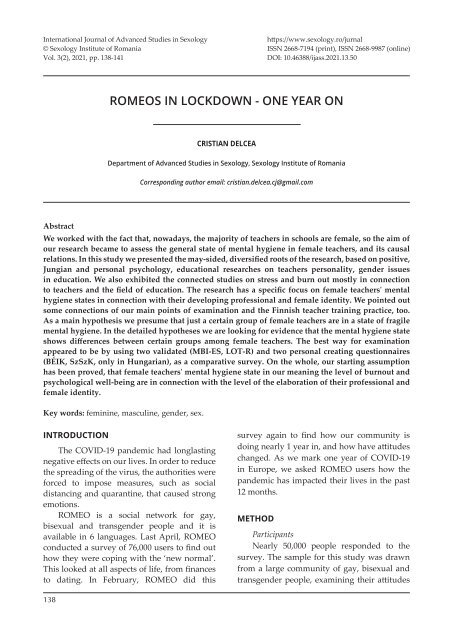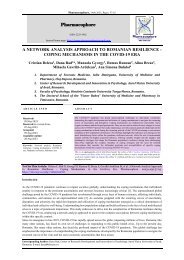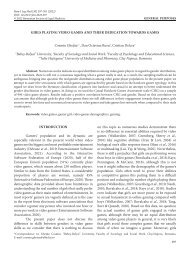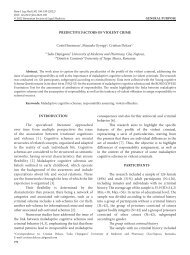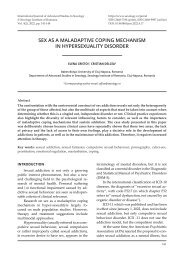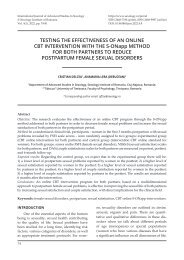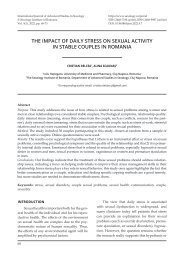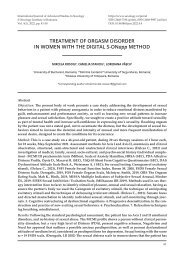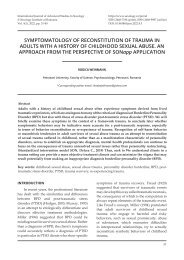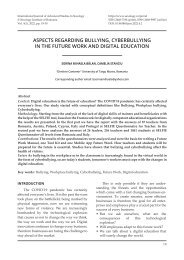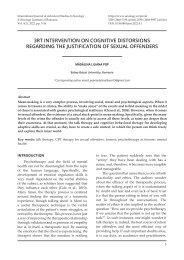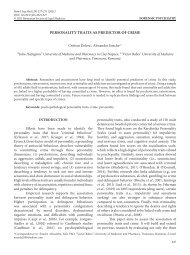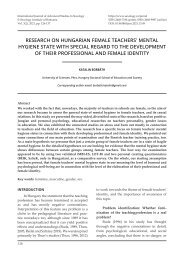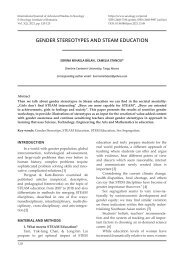138-141 Cristian Delcea - ROMEOs in Lockdown - One year on
Create successful ePaper yourself
Turn your PDF publications into a flip-book with our unique Google optimized e-Paper software.
Internati<strong>on</strong>al Journal of Advanced Studies <str<strong>on</strong>g>in</str<strong>on</strong>g> Sexology<br />
© Sexology Institute of Romania<br />
Vol. 3(2), 2021, pp. <str<strong>on</strong>g>138</str<strong>on</strong>g>-<str<strong>on</strong>g>141</str<strong>on</strong>g><br />
https://www.sexology.ro/jurnal<br />
ISSN 2668-7194 (pr<str<strong>on</strong>g>in</str<strong>on</strong>g>t), ISSN 2668-9987 (<strong>on</strong>l<str<strong>on</strong>g>in</str<strong>on</strong>g>e)<br />
DOI: 10.46388/ijass.2021.13.50<br />
ROMEOS IN LOCKDOWN - ONE YEAR ON<br />
CRISTIAN DELCEA<br />
Department of Advanced Studies <str<strong>on</strong>g>in</str<strong>on</strong>g> Sexology, Sexology Institute of Romania<br />
Corresp<strong>on</strong>d<str<strong>on</strong>g>in</str<strong>on</strong>g>g author email: cristian.delcea.cj@gmail.com<br />
Abstract<br />
We worked with the fact that, nowadays, the majority of teachers <str<strong>on</strong>g>in</str<strong>on</strong>g> schools are female, so the aim of<br />
our research became to assess the general state of mental hygiene <str<strong>on</strong>g>in</str<strong>on</strong>g> female teachers, and its causal<br />
relati<strong>on</strong>s. In this study we presented the may-sided, diversified roots of the research, based <strong>on</strong> positive,<br />
Jungian and pers<strong>on</strong>al psychology, educati<strong>on</strong>al researches <strong>on</strong> teachers pers<strong>on</strong>ality, gender issues<br />
<str<strong>on</strong>g>in</str<strong>on</strong>g> educati<strong>on</strong>. We also exhibited the c<strong>on</strong>nected studies <strong>on</strong> stress and burn out mostly <str<strong>on</strong>g>in</str<strong>on</strong>g> c<strong>on</strong>necti<strong>on</strong><br />
to teachers and the field of educati<strong>on</strong>. The research has a specific focus <strong>on</strong> female teachers' mental<br />
hygiene states <str<strong>on</strong>g>in</str<strong>on</strong>g> c<strong>on</strong>necti<strong>on</strong> with their develop<str<strong>on</strong>g>in</str<strong>on</strong>g>g professi<strong>on</strong>al and female identity. We po<str<strong>on</strong>g>in</str<strong>on</strong>g>ted out<br />
some c<strong>on</strong>necti<strong>on</strong>s of our ma<str<strong>on</strong>g>in</str<strong>on</strong>g> po<str<strong>on</strong>g>in</str<strong>on</strong>g>ts of exam<str<strong>on</strong>g>in</str<strong>on</strong>g>ati<strong>on</strong> and the F<str<strong>on</strong>g>in</str<strong>on</strong>g>nish teacher tra<str<strong>on</strong>g>in</str<strong>on</strong>g><str<strong>on</strong>g>in</str<strong>on</strong>g>g practice, too.<br />
As a ma<str<strong>on</strong>g>in</str<strong>on</strong>g> hypothesis we presume that just a certa<str<strong>on</strong>g>in</str<strong>on</strong>g> group of female teachers are <str<strong>on</strong>g>in</str<strong>on</strong>g> a state of fragile<br />
mental hygiene. In the detailed hypotheses we are look<str<strong>on</strong>g>in</str<strong>on</strong>g>g for evidence that the mental hygiene state<br />
shows differences between certa<str<strong>on</strong>g>in</str<strong>on</strong>g> groups am<strong>on</strong>g female teachers. The best way for exam<str<strong>on</strong>g>in</str<strong>on</strong>g>ati<strong>on</strong><br />
appeared to be by us<str<strong>on</strong>g>in</str<strong>on</strong>g>g two validated (MBI-ES, LOT-R) and two pers<strong>on</strong>al creat<str<strong>on</strong>g>in</str<strong>on</strong>g>g questi<strong>on</strong>naires<br />
(BÉIK, SzSzK, <strong>on</strong>ly <str<strong>on</strong>g>in</str<strong>on</strong>g> Hungarian), as a comparative survey. On the whole, our start<str<strong>on</strong>g>in</str<strong>on</strong>g>g assumpti<strong>on</strong><br />
has been proved, that female teachers' mental hygiene state <str<strong>on</strong>g>in</str<strong>on</strong>g> our mean<str<strong>on</strong>g>in</str<strong>on</strong>g>g the level of burnout and<br />
psychological well-be<str<strong>on</strong>g>in</str<strong>on</strong>g>g are <str<strong>on</strong>g>in</str<strong>on</strong>g> c<strong>on</strong>necti<strong>on</strong> with the level of the elaborati<strong>on</strong> of their professi<strong>on</strong>al and<br />
female identity.<br />
Key words: fem<str<strong>on</strong>g>in</str<strong>on</strong>g><str<strong>on</strong>g>in</str<strong>on</strong>g>e, mascul<str<strong>on</strong>g>in</str<strong>on</strong>g>e, gender, sex.<br />
INTRODUCTION<br />
The COVID-19 pandemic had l<strong>on</strong>glast<str<strong>on</strong>g>in</str<strong>on</strong>g>g<br />
negative effects <strong>on</strong> our lives. In order to reduce<br />
the spread<str<strong>on</strong>g>in</str<strong>on</strong>g>g of the virus, the authorities were<br />
forced to impose measures, such as social<br />
distanc<str<strong>on</strong>g>in</str<strong>on</strong>g>g and quarant<str<strong>on</strong>g>in</str<strong>on</strong>g>e, that caused str<strong>on</strong>g<br />
emoti<strong>on</strong>s.<br />
ROMEO is a social network for gay,<br />
bisexual and transgender people and it is<br />
available <str<strong>on</strong>g>in</str<strong>on</strong>g> 6 languages. Last April, ROMEO<br />
c<strong>on</strong>ducted a survey of 76,000 users to f<str<strong>on</strong>g>in</str<strong>on</strong>g>d out<br />
how they were cop<str<strong>on</strong>g>in</str<strong>on</strong>g>g with the ‘new normal’.<br />
This looked at all aspects of life, from f<str<strong>on</strong>g>in</str<strong>on</strong>g>ances<br />
to dat<str<strong>on</strong>g>in</str<strong>on</strong>g>g. In February, ROMEO did this<br />
survey aga<str<strong>on</strong>g>in</str<strong>on</strong>g> to f<str<strong>on</strong>g>in</str<strong>on</strong>g>d how our community is<br />
do<str<strong>on</strong>g>in</str<strong>on</strong>g>g nearly 1 <str<strong>on</strong>g>year</str<strong>on</strong>g> <str<strong>on</strong>g>in</str<strong>on</strong>g>, and how have attitudes<br />
changed. As we mark <strong>on</strong>e <str<strong>on</strong>g>year</str<strong>on</strong>g> of COVID-19<br />
<str<strong>on</strong>g>in</str<strong>on</strong>g> Europe, we asked ROMEO users how the<br />
pandemic has impacted their lives <str<strong>on</strong>g>in</str<strong>on</strong>g> the past<br />
12 m<strong>on</strong>ths.<br />
METHOD<br />
Participants<br />
Nearly 50,000 people resp<strong>on</strong>ded to the<br />
survey. The sample for this study was drawn<br />
from a large community of gay, bisexual and<br />
transgender people, exam<str<strong>on</strong>g>in</str<strong>on</strong>g><str<strong>on</strong>g>in</str<strong>on</strong>g>g their attitudes<br />
<str<strong>on</strong>g>138</str<strong>on</strong>g>
<str<strong>on</strong>g>ROMEOs</str<strong>on</strong>g> <str<strong>on</strong>g>in</str<strong>on</strong>g> <str<strong>on</strong>g>Lockdown</str<strong>on</strong>g> - <str<strong>on</strong>g>One</str<strong>on</strong>g> <str<strong>on</strong>g>year</str<strong>on</strong>g> <strong>on</strong><br />
toward the measures <str<strong>on</strong>g>in</str<strong>on</strong>g> their country dur<str<strong>on</strong>g>in</str<strong>on</strong>g>g<br />
the pandemic period, their emoti<strong>on</strong>al state,<br />
their level of health anxiety, the level of worry<br />
<str<strong>on</strong>g>in</str<strong>on</strong>g> regard to their f<str<strong>on</strong>g>in</str<strong>on</strong>g>ancial status, as well as the<br />
feel<str<strong>on</strong>g>in</str<strong>on</strong>g>g of worry for their local gay community.<br />
Measures<br />
This study was qualitative. The participants<br />
were asked the follow<str<strong>on</strong>g>in</str<strong>on</strong>g>g questi<strong>on</strong>s:<br />
`What do you th<str<strong>on</strong>g>in</str<strong>on</strong>g>k about the measures <str<strong>on</strong>g>in</str<strong>on</strong>g> your<br />
country?`, `How are you feel<str<strong>on</strong>g>in</str<strong>on</strong>g>g <str<strong>on</strong>g>in</str<strong>on</strong>g> general?`,<br />
`Are you worried about your health?`, `Are<br />
you worried about your f<str<strong>on</strong>g>in</str<strong>on</strong>g>ancial future?`,<br />
`Are you worried about the future of your local<br />
gay community?` and aga<str<strong>on</strong>g>in</str<strong>on</strong>g> `Are you worried<br />
about your f<str<strong>on</strong>g>in</str<strong>on</strong>g>ancial future?`, compar<str<strong>on</strong>g>in</str<strong>on</strong>g>g the<br />
answers from Europrans with those from the<br />
develop<str<strong>on</strong>g>in</str<strong>on</strong>g>g countries.<br />
RESULTS<br />
In the sec<strong>on</strong>d graphic, we can see the<br />
results for the questi<strong>on</strong> ‘How are you feel<str<strong>on</strong>g>in</str<strong>on</strong>g>g<br />
<str<strong>on</strong>g>in</str<strong>on</strong>g> general’ <str<strong>on</strong>g>in</str<strong>on</strong>g> 2021, <str<strong>on</strong>g>in</str<strong>on</strong>g> comparis<strong>on</strong> to the last<br />
<str<strong>on</strong>g>year</str<strong>on</strong>g>. With 10.0% less than last <str<strong>on</strong>g>year</str<strong>on</strong>g>, <strong>on</strong>ly 9.9%<br />
of the resp<strong>on</strong>dents claimed that they felt very<br />
good. It seems that 2020 was a better <str<strong>on</strong>g>year</str<strong>on</strong>g> for<br />
the people who said they feel ‘good’, while <str<strong>on</strong>g>in</str<strong>on</strong>g><br />
2021, the percentage decreased with 11.8%,<br />
reach<str<strong>on</strong>g>in</str<strong>on</strong>g>g <strong>on</strong>ly 25.0%. 42.6% answered that they<br />
were O.K., with 10.2% more than last <str<strong>on</strong>g>year</str<strong>on</strong>g>,<br />
when <strong>on</strong>ly 32.4% claimed they were feel<str<strong>on</strong>g>in</str<strong>on</strong>g>g<br />
O.K. In 2020, 8.0% claimed thay were feel<str<strong>on</strong>g>in</str<strong>on</strong>g>g<br />
bad. Unfortunately, <str<strong>on</strong>g>in</str<strong>on</strong>g> 2021, people feel worse<br />
than last April, the percentage <str<strong>on</strong>g>in</str<strong>on</strong>g>cres<str<strong>on</strong>g>in</str<strong>on</strong>g>g with<br />
9.7%. 3.9% said they were feel<str<strong>on</strong>g>in</str<strong>on</strong>g>g very bad<br />
<str<strong>on</strong>g>in</str<strong>on</strong>g> 2021, <str<strong>on</strong>g>in</str<strong>on</strong>g> comparis<strong>on</strong> with 2020, when the<br />
percentage was smaller with 1.7%. This <str<strong>on</strong>g>in</str<strong>on</strong>g>dicates<br />
that mental health specialists should be<br />
prepared for a <str<strong>on</strong>g>in</str<strong>on</strong>g>flux of the patients.<br />
Be<str<strong>on</strong>g>in</str<strong>on</strong>g>g asked about what they th<str<strong>on</strong>g>in</str<strong>on</strong>g>k<br />
regard<str<strong>on</strong>g>in</str<strong>on</strong>g>g the measures taken <str<strong>on</strong>g>in</str<strong>on</strong>g> their country,<br />
10.7% of the resp<strong>on</strong>dents said that, <str<strong>on</strong>g>in</str<strong>on</strong>g> 2021, the<br />
measures were by far too strict, 14.7% said that<br />
the measures could be a bit less strict. 26.1%<br />
c<strong>on</strong>sidered that the measures were just right,<br />
while <str<strong>on</strong>g>in</str<strong>on</strong>g> 2020 there were 14.3% more people<br />
who completely agreed with the strictness of<br />
the measures. The percentage of people who<br />
thought that the measures imposed could be<br />
stricter rose with 5.6 percent <str<strong>on</strong>g>in</str<strong>on</strong>g> 2021 than last<br />
<str<strong>on</strong>g>year</str<strong>on</strong>g>, when the percentage was 24.4. Last but<br />
not least, 14.2% of the resp<strong>on</strong>dents believed<br />
that the measures are by far not strict enough,<br />
with 6.1% more than last <str<strong>on</strong>g>year</str<strong>on</strong>g>.<br />
The third graphic illustrates the levels of<br />
worry about health. In comparis<strong>on</strong> to 2020,<br />
<strong>on</strong>ly 19.1% of the <str<strong>on</strong>g>in</str<strong>on</strong>g>terviewed people said they<br />
139
CRISTIAN DELCEA<br />
are not worried at all, still with 6.2% less than<br />
last <str<strong>on</strong>g>year</str<strong>on</strong>g>. Less than <str<strong>on</strong>g>in</str<strong>on</strong>g> 2020 with 5.1%, 25.9%<br />
claimed they are feel<str<strong>on</strong>g>in</str<strong>on</strong>g>g neutral, whereas the<br />
percentage of the people who said that they<br />
are a little bit worried rose with 1.8% this <str<strong>on</strong>g>year</str<strong>on</strong>g>,<br />
reach<str<strong>on</strong>g>in</str<strong>on</strong>g>g 33.2%. 16.1% resp<strong>on</strong>ded affirmative<br />
about feel<str<strong>on</strong>g>in</str<strong>on</strong>g>g worried about their health <str<strong>on</strong>g>in</str<strong>on</strong>g><br />
2021, while <str<strong>on</strong>g>in</str<strong>on</strong>g> 2020, <strong>on</strong>ly 9.3% were worried.<br />
Unfortunately, the percentage of people who<br />
are feel<str<strong>on</strong>g>in</str<strong>on</strong>g>g very worried <str<strong>on</strong>g>in</str<strong>on</strong>g> the current <str<strong>on</strong>g>year</str<strong>on</strong>g><br />
raised with 2.7%, reach<str<strong>on</strong>g>in</str<strong>on</strong>g>g 5.2%.<br />
It seems that, this pandemic <str<strong>on</strong>g>year</str<strong>on</strong>g>, the<br />
percentage of the resp<strong>on</strong>dents who have<br />
neutral feel<str<strong>on</strong>g>in</str<strong>on</strong>g>g or feel no worry at all about the<br />
gay community decreased from 18.4% to 13.4%<br />
and from 20.1% to 13.5%, respectively.<br />
The next graphic illustrates the levels of<br />
worry regard<str<strong>on</strong>g>in</str<strong>on</strong>g>g f<str<strong>on</strong>g>in</str<strong>on</strong>g>ancial future. It seems that,<br />
<str<strong>on</strong>g>in</str<strong>on</strong>g> March 2021, there were with 0.6% more<br />
resp<strong>on</strong>dents who claimed that they are very<br />
worried about their m<strong>on</strong>ey, <str<strong>on</strong>g>in</str<strong>on</strong>g> comparis<strong>on</strong> to<br />
2020, when 10.6% answered affirmative. There<br />
is a slight difference (0.1%) between last <str<strong>on</strong>g>year</str<strong>on</strong>g><br />
and the current <str<strong>on</strong>g>year</str<strong>on</strong>g> regard<str<strong>on</strong>g>in</str<strong>on</strong>g>g people who<br />
said they are feel<str<strong>on</strong>g>in</str<strong>on</strong>g>g worried, decreas<str<strong>on</strong>g>in</str<strong>on</strong>g>g from<br />
14.2 to 14.1%. The percentage decreased also<br />
for the answer ‘a little bit worried’ with 3.1%,<br />
reach<str<strong>on</strong>g>in</str<strong>on</strong>g>g 22.4% <str<strong>on</strong>g>in</str<strong>on</strong>g> 2021. In 2021, with 1.3% and<br />
1.2% more than last <str<strong>on</strong>g>year</str<strong>on</strong>g>, 22.3% and 29.2%<br />
respectively answered that they are neutral or<br />
not at all worried about their f<str<strong>on</strong>g>in</str<strong>on</strong>g>ancial future.<br />
Overall, people seem to be less worried about<br />
their f<str<strong>on</strong>g>in</str<strong>on</strong>g>ancial future than last <str<strong>on</strong>g>year</str<strong>on</strong>g>.<br />
Look<str<strong>on</strong>g>in</str<strong>on</strong>g>g at the c<strong>on</strong>cerns regard<str<strong>on</strong>g>in</str<strong>on</strong>g>g the<br />
future of their local gay community, 26.1% said<br />
they are feel<str<strong>on</strong>g>in</str<strong>on</strong>g>g very worried <str<strong>on</strong>g>in</str<strong>on</strong>g> February 2021,<br />
with 12.7% more than last spr<str<strong>on</strong>g>in</str<strong>on</strong>g>g. 25.9% are<br />
worried <str<strong>on</strong>g>in</str<strong>on</strong>g> 2021, with 4.2% more than <str<strong>on</strong>g>in</str<strong>on</strong>g> 2020.<br />
18.2% are feel<str<strong>on</strong>g>in</str<strong>on</strong>g>g a little bit worried this <str<strong>on</strong>g>year</str<strong>on</strong>g>,<br />
while <str<strong>on</strong>g>in</str<strong>on</strong>g> 2020, 22.3% claimed to feel this way.<br />
Europe compared with Develop<str<strong>on</strong>g>in</str<strong>on</strong>g>g<br />
Countries<br />
As lockdowns and restricti<strong>on</strong>s c<strong>on</strong>t<str<strong>on</strong>g>in</str<strong>on</strong>g>ue,<br />
we see the grave impact they are hav<str<strong>on</strong>g>in</str<strong>on</strong>g>g <strong>on</strong><br />
the poorest societies. We see from the survey<br />
answers that those <str<strong>on</strong>g>in</str<strong>on</strong>g> develop<str<strong>on</strong>g>in</str<strong>on</strong>g>g countries are<br />
fac<str<strong>on</strong>g>in</str<strong>on</strong>g>g a real threat to their lives, not just from<br />
COVID-19 but from the restricti<strong>on</strong>s that make<br />
it hard for people to survive.<br />
Accord<str<strong>on</strong>g>in</str<strong>on</strong>g>g to the results of this survey,<br />
26.6% of the resp<strong>on</strong>dents from the develop<str<strong>on</strong>g>in</str<strong>on</strong>g>g<br />
countries are feel<str<strong>on</strong>g>in</str<strong>on</strong>g>g very worried about their<br />
f<str<strong>on</strong>g>in</str<strong>on</strong>g>ancial future, with 16.8% more than the<br />
percentage from Europe. A difference of 5.3%<br />
140
<str<strong>on</strong>g>ROMEOs</str<strong>on</strong>g> <str<strong>on</strong>g>in</str<strong>on</strong>g> <str<strong>on</strong>g>Lockdown</str<strong>on</strong>g> - <str<strong>on</strong>g>One</str<strong>on</strong>g> <str<strong>on</strong>g>year</str<strong>on</strong>g> <strong>on</strong><br />
we can notice <str<strong>on</strong>g>in</str<strong>on</strong>g> the same way regard<str<strong>on</strong>g>in</str<strong>on</strong>g>g how<br />
worried people feel for the f<str<strong>on</strong>g>in</str<strong>on</strong>g>ancial status:<br />
18.7% <str<strong>on</strong>g>in</str<strong>on</strong>g> the develop<str<strong>on</strong>g>in</str<strong>on</strong>g>g countries, versus 13.4%.<br />
There is a small difference of 2.1% between<br />
these two areas regard<str<strong>on</strong>g>in</str<strong>on</strong>g>g the fact that they feel<br />
a little bit worried (23.2% <str<strong>on</strong>g>in</str<strong>on</strong>g> the develop<str<strong>on</strong>g>in</str<strong>on</strong>g>g<br />
nati<strong>on</strong>s versus 22.1% <str<strong>on</strong>g>in</str<strong>on</strong>g> Europe). With 6.7%<br />
less people from the develop<str<strong>on</strong>g>in</str<strong>on</strong>g>g nati<strong>on</strong>s are<br />
feel<str<strong>on</strong>g>in</str<strong>on</strong>g>g neutral, reach<str<strong>on</strong>g>in</str<strong>on</strong>g>g 16.2%, while <strong>on</strong>ly<br />
12.6% from the develop<str<strong>on</strong>g>in</str<strong>on</strong>g>g countries answered<br />
that they are not at all worried. In c<strong>on</strong>trast,<br />
31.6% of the resp<strong>on</strong>dents com<str<strong>on</strong>g>in</str<strong>on</strong>g>g from Europe<br />
said that they do not feel any worry at all for<br />
their f<str<strong>on</strong>g>in</str<strong>on</strong>g>ancial future.<br />
Implicati<strong>on</strong>s of the results<br />
The current study rises c<strong>on</strong>cerns to<br />
specialists regard<str<strong>on</strong>g>in</str<strong>on</strong>g>g a possible mental health<br />
pandemic`, given the fact that the LGBTQ+<br />
sample that participated <str<strong>on</strong>g>in</str<strong>on</strong>g>to this study<br />
reported more levels of worry for their health,<br />
their f<str<strong>on</strong>g>in</str<strong>on</strong>g>ancial status and the future of the local<br />
gay community.<br />
Discussi<strong>on</strong><br />
To our knowledge, this study is am<strong>on</strong>g the<br />
first to describe the experience of the LGBTQ+<br />
community, <strong>on</strong>e <str<strong>on</strong>g>year</str<strong>on</strong>g> after the COVID-19<br />
pandemic began. Unfortunately, more people<br />
compla<str<strong>on</strong>g>in</str<strong>on</strong>g>ed they felt very worried about the<br />
future of their local gay community <str<strong>on</strong>g>in</str<strong>on</strong>g> February<br />
2021, with 12.7% more than last March. The<br />
good part is that, this <str<strong>on</strong>g>year</str<strong>on</strong>g>, significantly more<br />
people felt O.K. than <str<strong>on</strong>g>in</str<strong>on</strong>g> 2020. Also, the levels of<br />
worry for their health status rose <str<strong>on</strong>g>in</str<strong>on</strong>g> 2021, for the<br />
participants who claimed they were feel<str<strong>on</strong>g>in</str<strong>on</strong>g>g `a<br />
little bit worried`, `worried` and `very worried`<br />
at the beg<str<strong>on</strong>g>in</str<strong>on</strong>g>n<str<strong>on</strong>g>in</str<strong>on</strong>g>g of the pandemic.<br />
Limitati<strong>on</strong>s<br />
Given the fact that the study was <strong>on</strong>ly<br />
descriptive, the depth of the analysis is questi<strong>on</strong>able.<br />
The possible factors lead<str<strong>on</strong>g>in</str<strong>on</strong>g>g to an<br />
<str<strong>on</strong>g>in</str<strong>on</strong>g>crease or decrease of the measured variables<br />
were not sufficiently <str<strong>on</strong>g>in</str<strong>on</strong>g>vestigated. <str<strong>on</strong>g>One</str<strong>on</strong>g><br />
explanati<strong>on</strong> – that rema<str<strong>on</strong>g>in</str<strong>on</strong>g>s uncerta<str<strong>on</strong>g>in</str<strong>on</strong>g> – is that<br />
the restricti<strong>on</strong>s were c<strong>on</strong>fus<str<strong>on</strong>g>in</str<strong>on</strong>g>g for our participants.<br />
The situati<strong>on</strong> <str<strong>on</strong>g>in</str<strong>on</strong>g> many life areas has been<br />
profoundly unpredictable. Another reas<strong>on</strong><br />
might be the creati<strong>on</strong> of the vacc<str<strong>on</strong>g>in</str<strong>on</strong>g>es, which<br />
came al<strong>on</strong>g with a lot of c<strong>on</strong>troversy regard<str<strong>on</strong>g>in</str<strong>on</strong>g>g<br />
its benefits.<br />
CONCLUSION<br />
In c<strong>on</strong>clusi<strong>on</strong>, we see that age or fear of<br />
f<str<strong>on</strong>g>in</str<strong>on</strong>g>ancial future has very little impact <strong>on</strong> our<br />
<str<strong>on</strong>g>ROMEOs</str<strong>on</strong>g> op<str<strong>on</strong>g>in</str<strong>on</strong>g>i<strong>on</strong> of the measures <str<strong>on</strong>g>in</str<strong>on</strong>g> their<br />
countries, this is c<strong>on</strong>sistent across countries. It<br />
looks like we have a pretty selfless community.<br />
Thanks to all <str<strong>on</strong>g>ROMEOs</str<strong>on</strong>g> who took part <str<strong>on</strong>g>in</str<strong>on</strong>g><br />
our survey, we appreciate you shar<str<strong>on</strong>g>in</str<strong>on</strong>g>g your<br />
experiences. If you would like more detailed<br />
<str<strong>on</strong>g>in</str<strong>on</strong>g>formati<strong>on</strong> about the top 10 participat<str<strong>on</strong>g>in</str<strong>on</strong>g>g<br />
countries you will f<str<strong>on</strong>g>in</str<strong>on</strong>g>d the reports attached.<br />
BIBLIOGRAPHY<br />
1. Johns<strong>on</strong>, S. D. (2012). Gay affirmative<br />
psychotherapy with lesbian, gay, and bisexual<br />
<str<strong>on</strong>g>in</str<strong>on</strong>g>dividuals: Implicati<strong>on</strong>s for c<strong>on</strong>temporary<br />
psychotherapy research. American Journal of<br />
Orthopsychiatry, 82(4), 516–522. https://doi.<br />
org/10.1111/j.1939-0025.2012.01180.x<br />
2. Perez, R. M., DeBord, K. A., & Bieschke, K.<br />
J. (Eds.). (2000). Handbook of counsel<str<strong>on</strong>g>in</str<strong>on</strong>g>g and<br />
psychotherapy with lesbian, gay, and bisexual clients.<br />
American Psychological Associati<strong>on</strong>. https://doi.<br />
org/10.1037/10339-000<br />
3. Ritter, K. Y., Terndrup, A., I., & Terndrup, A.<br />
(2002). Handbook of Affirmative Psychotherapy with<br />
Lesbians and Gay Men (1st ed.). The Guilford Press.<br />
4. Rossman, K., Salamanca, P., & Macapagal,<br />
K. (2017). A Qualitative Study Exam<str<strong>on</strong>g>in</str<strong>on</strong>g><str<strong>on</strong>g>in</str<strong>on</strong>g>g<br />
Young Adults’ Experiences of Disclosure and<br />
N<strong>on</strong>disclosure of LGBTQ Identity to Health Care<br />
Providers. Journal of homosexuality, 64(10), 1390–<br />
<str<strong>on</strong>g>141</str<strong>on</strong>g>0. https://doi.org/10.1080/00918369.2017.1321<br />
379<br />
5. Whitman, J. S., & Boyd, C. J. (2020). Homework<br />
Assignments and Handouts for LGBTQ+ Clients: A<br />
Mental Health and Counsel<str<strong>on</strong>g>in</str<strong>on</strong>g>g Handbook (1st ed.).<br />
Routledge.<br />
6. Whitman, J. S. (2021). Therapists Notebook for<br />
Lesbian, Gay, & Bisexual Clients by Whitman, Joy S.,<br />
Boyd, Cynthia J. [Paperback]. Ruotledge, 2003.<br />
<str<strong>on</strong>g>141</str<strong>on</strong>g>


